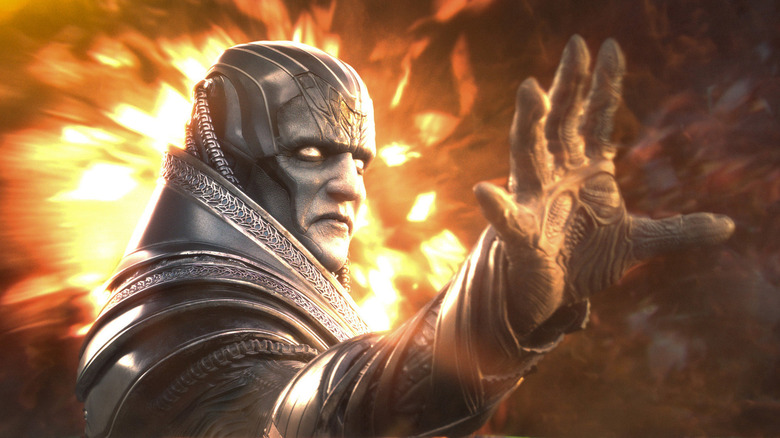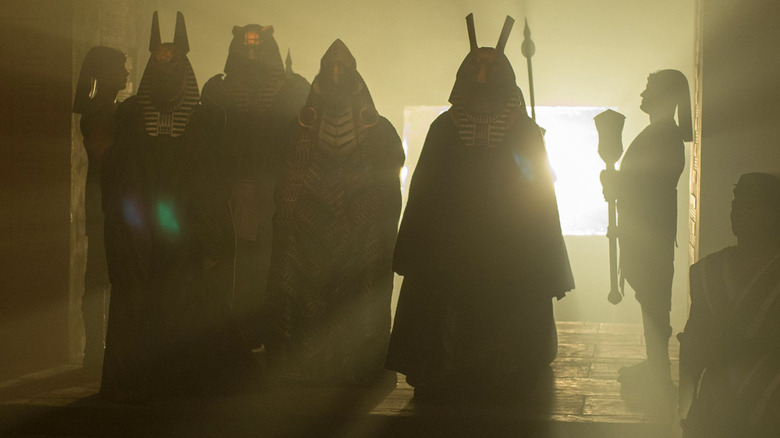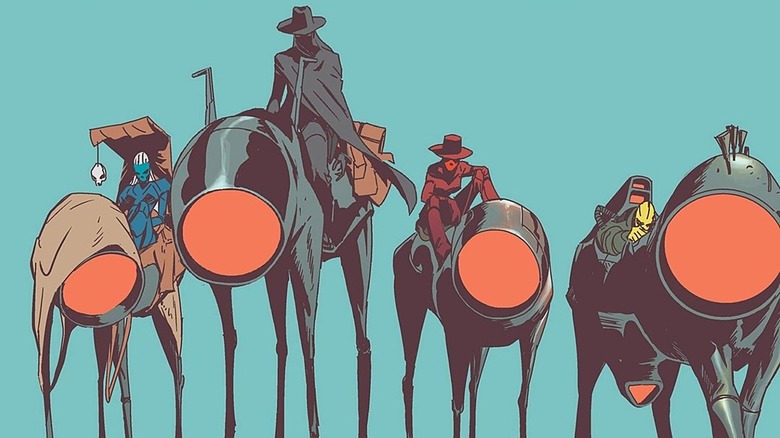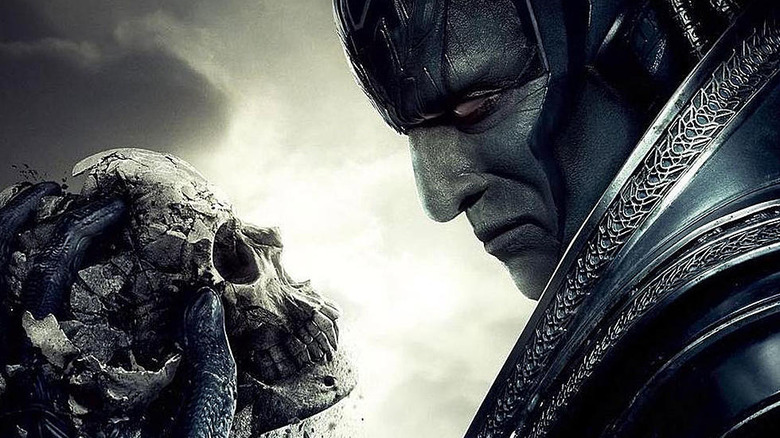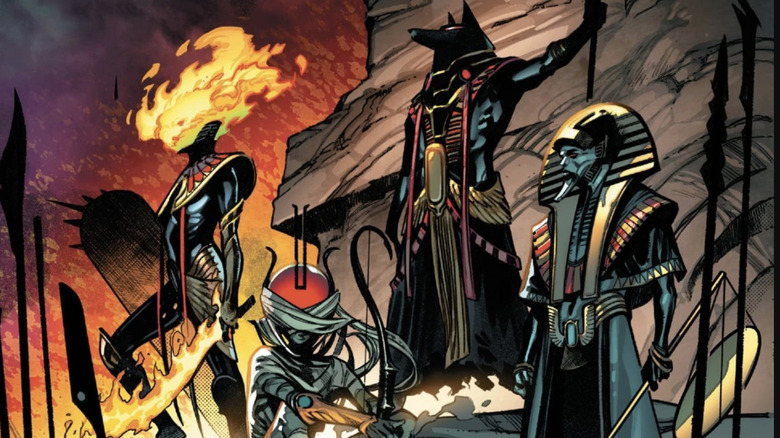X-Men: Apocalypse Shaped How One Marvel Comic Writer Approached The Villain
If you're an "X-Men" fan, you should be listening to the "Cerebro" podcast. The host, literary agent/"X-Men" historian Connor Goldsmith, and a guest (usually an "X-Men" writer or fan of some repute) discuss a chosen character — both their history and why they resonate.
The 101st episode of "Cerebro" (released May 2023) featured comic writer Jonathan Hickman, who relaunched the X-Men comics alongside artist Pepe Larraz in 2019 with intersecting miniseries "House of X" & "Powers of X" (the latter pronounced like the number 10). For the episode, they discuss En Sabah Nur/Apocalypse, the most infamous X-Men antagonist not named Magneto.
Writer Louise Simonson and artist Jackson "Butch" Guice created Apocalypse in 1986 as the shadowy villain for their book "X-Factor." He was revealed to be an immortal mutant, possibly the very first one (stories claimed his birth name supposedly translated to "The First One," though a more accurate translation is "the Seven Lights," i.e. dawn). Born in Ancient Egypt, Apocalypse has shaped the curve of history to Herbert Spencer's survival of the fittest ethos.
The villain was (poorly) adapted in the bluntly titled 2016 film "X-Men: Apocalypse," played by Oscar Isaac in a performance that calls on none of his strengths as an actor. On "Cerebro," Hickman agrees the movie was "terrible" overall — except for the opening sequence. "X-Men: Apocalypse" begins in Egypt circa 3600 BC, when En Sabah Nur rules the Nile Valley. He is served by four mutant disciples — the Horsemen of Apocalypse. Hickman described this sequence as "Stargate: Apocalypse," recalling the 1994 blockbuster about ancient aliens ruling Egypt.
Stargate: Apocalypse
The concept of the Horsemen and their names (War, Famine, Pestilence, and Death) comes from the Book of Revelation, though Marvel stories (including the film) suggest John the Elder got the idea from Apocalypse, not the other way around.
While riding on horseback towards Apocalypse's pyramid palace, he and his Horsemen wear golden masks modeled after Egyptian Gods; En Sabah Nur is Ra (the bird-headed God who held dominion over the sun), Death is Anubis (the jackal-headed God associated with the dead), and so on. Their human subjects betray them, collapsing the pyramid, killing the Horsemen, and sending an unconscious Apocalypse plummeting underground, where he won't awaken until 1983. "I remember watching the first 10 minutes of that movie and I was like, 'I am so f*cking into this right now' and then [the rest of the movie] is sh*t," Hickman recalled.
From there, the movie does a "Rip Van Winkle" plot of Apocalypse waking up in the modern day and deciding the world must be "cleansed." His education about the modern world begins and ends with him interfacing with a TV and "Leeeaaarning." As a two-hour blockbuster that needed a bad guy for the heroes to punch, "X-Men: Apocalypse" relies on superhero movie clichés and thin characterization.
The Horsemen of the Apocalypse
Hickman and his fellow writers/artists had the benefit of time; you can tell a much longer story in a serialized comic than in one film. His "X-Men" relaunch delved into the history of En Sabah Nur and reckoned with what being truly ancient does to someone in more than surface-level ways. Still, the movie remained in the back of his head as an influence; he especially liked the idea of exploring Apocalypse's disciples:
"I remember walking out of ['X-Men: Apocalypse'] and I'm like, that's a good idea. The first Horsemen of the Apocalypse, the first versions of those guys."
Apocalypse has been served by Horsemen since almost his debut in the comics; in "X-Factor," he corrupted the X-Man Angel into becoming Death, gilding his wings with steel. One of the few inspired moments in "X-Men: Apocalypse" depicts this, emphasizing the body horror as new wings sprout from Angel's (Ben Hardy) body while Metallica's "The Four Horsemen" plays. Since "X-Factor", stories have continually featured other X-Men, from Gambit to Wolverine, falling under Apocalypse's sway as Horsemen.
Hickman's creator-owned comic "East of West" (drawn by Nick Dragotta) also features the Four Horsemen of the Apocalypse as characters — not the Marvel versions, but a new interpretation of the mythical concept. "East of West" is an alternate history sci-fi Western about North America, divided between seven nations, on the brink of civil war.
The "East of West" Horsemen don't serve a single master but are metaphysical embodiments of their names. They continuously reincarnate, fulfilling their inevitable duties whenever a civilization is due to fall — except Death, who fell in love with a human woman and has become a wandering gunslinger.
With this on his résumé, it makes sense why Hickman was drawn to exploring Apocalypse's Horsemen. What about their master, though?
An ancient Apocalypse
Some context for those who don't keep up on comics: Hickman relaunched the entire X-Men status quo. Led by Xavier, Magneto, and silent partner Moira MacTaggert, the mutants of the world settle on the living island of Krakoa, creating a mutant homeland, culture, and industry. Hickman wrote the mainline "X-Men" title and "New Mutants," while other writers/artists wrote other series, all exploring the nooks and crannies of this new world.
With the nationalist ethos of Krakoa as a land for all mutants, the most identifiable X-Men make a controversial move: they pardon all mutant villains and give them Krakoan citizenship. Apocalypse is seated on the nation's 12-mutant ruling body, the Quiet Council. On "Cerebro," Goldsmith compared this to the modern Irish government, comprised of both the IRA and unionists they once fought.
Hickman noted he went this route to underline that Krakoa was not an unambiguous good; if Apocalypse is proud of what the X-Men are doing, shouldn't that give readers pause? At the same time, the Krakoa-era "X-Men" books approached him as more than a villain to be overcome.
Hickman explained that he considers Apocalypse's philosophy of evolution by force to be "the third option" for a mutant future between Professor X (who represents Liberal integrationism) and Magneto (or militant separatism). He also has the lessons of history to back it up. What's monstrous to us isn't to Apocalypse because he doesn't conceive of time or collective good in the same way we do with our fragile lives. "When you've seen republics fall, your idea of society is radically different than people living in the now," Hickman argued.
X-Men: X of Swords
The first major crossover event of Krakoa was "X of Swords" (again pronounced like 10, mostly overseen by Hickman and "Excalibur" writer Tini Howard, though each writer penned their own series' tie-in issue). The event made Apocalypse's history the centerpiece of its story.
The basics: Krakoa was once part of a larger island called Okkara, settled by mutants (including Apocalypse) in ancient times. Apocalypse raised a family with his wife, named (what else?) Genesis. Their children were his original four Horsemen. Hickman explained his thought process: "[The Four Horsemen] were his actual kids, so he must have been married at some point. What a bad b*tch that must've been."
As for their terrifying names? In the 2023 one-shot "X-Men: Before the Fall — Heralds of Apocalypse," (written by Al Ewing, drawn by Luca Pizzari), Apocalypse declares they're named after "concept[s] lost to the past" on Okkara.
Then, demons from the hell dimension Amenth invaded this mutant paradise. Okkara was split; one half (Krakoa) remained on Earth, and the other (Arakko) went to Amenth to fight the demons, living in constant war. Among the Arakkii were Genesis and the Horsemen — now that they're back and displeased with En Sabah Nur.
The original Horsemen are all Egyptian-styled, nodding to their father's birthplace. Death has the jackal head of Anubis, Pestilence is bandaged like a mummy with the crown of Hathor, Famine wears a Pharaoh's crown, and War has a regal collar. The designs aren't exact replicas of the movie Horsemen, but Hickman confirmed they were an influence:
"When we had them designed, when Pepe did all that, [I said], 'Go look at this movie, we want something that feels Egyptian the same way that [Apocalypse] feels Egyptian.'"
It's pretty incredible that a movie that Jonathan Hickman doesn't even like influenced his own writing. Still, writers of his talent understand that bad ideas are rarer than bad execution.
